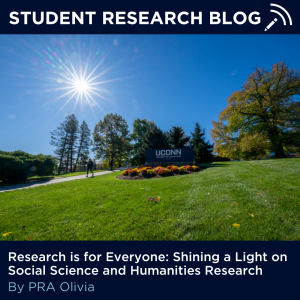 By Olivia Joyce, Peer Research Ambassador
By Olivia Joyce, Peer Research Ambassador
There is a common narrative that all research happens in wet labs and only is occurs in STEM fields with lab coats and beakers. However, this is far from accurate. Every full-time faculty member here is engaged in some form of research in all fields and departments at UConn. Research is designed for all fields, and everyone belongs in research no matter their major or background. I have been lucky enough to engage in several different social science projects research throughout my time here at University of Connecticut in fields like Political Science and Psychology. Social science research can help us explain things that can’t be captured through experiments and lab work, but instead can help us explain society and behavior.
As a Political Science and Statistics major, I have participated in many meaningful projects in the social sciences. An important experience to highlight was my summer spent participating in the Social Science, Humanities, and Arts Research Experience (SHARE) program through OUR. This was one of my first research experiences, after the summer of freshman year. I worked with Dr. Zehra Arat, a faculty member in Political Science. Throughout the summer I helped to work on her book about Human Rights trends and language in Turkey. This project gave me a good look at different methods in political science from qualitative data organization and quantitative data analysis, while working to understand trends over time in human rights language and how it differed based on time period and party affiliation. Social science research is incredibly diverse methodologically and you can find something that fits all interests!
I also previously worked as a research assistant for CIRIRIGHTS, where I was working to research acts of violence throughout the entire world, including variables like extrajudicial killings and torture. It is clear that there needs to be more accountability and protections against violence across the world, and this is the impact that can be made with social science research – it can be used to identify problems and help make the push for a safer world for all. This past summer I received a Caxide Scholars Grant, to explore a project titled “Legal Protections Against Non-State Actor Torture: The Case of Gender-Based Violence in the United States.” I focused on torture provisions in the United States, and what states had protections from torture in their legal codes. There have been no significant pushes to include torture protections under many state laws or federal laws, which means many forms of violence remain unprotected to the fullest extent of the law.
There are so many opportunities with the humanities and social sciences. Research in these fields is incredibly valuable, and every student should take the opportunity to explore opportunities to research and expand knowledge in their respective fields. Research in these fields start with questioning something we are seeing and why it happens. Sometimes social science research is not as cut and dry as STEM research. It is harder to run experiments on social phenomenon. Social science research is incredibly different and the experience of doing research is very different, but it is still just as valuable and important for expanding and pursuing knowledge. Social science research can play a role in making incredible change and impact in the world, and everyone can participate (even STEM majors) in social science research and help to make an impact on the world. Social science research can have implications across so many different fields, from government, policy, and social movements. Research is for everyone, and social science research can teach you so much about yourself and your interests!